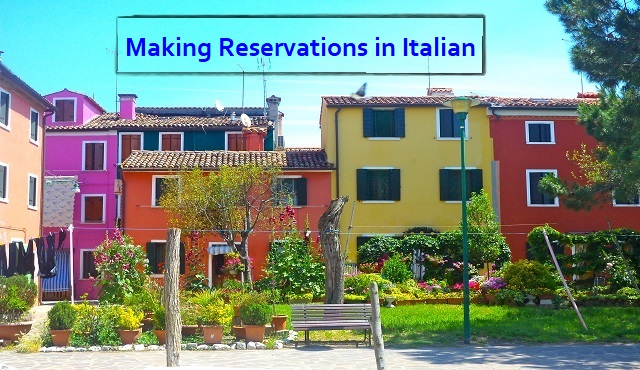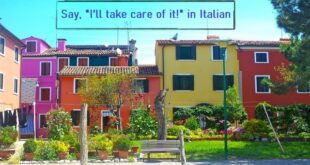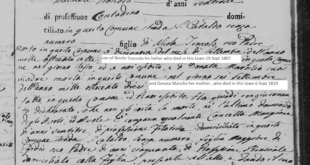Prior to beginning the lesson for this blog, I acknowledge that in the larger cities of Italy it is not usually necessary to make reservations in Italian; the Italian staff usually speak basic English and often the languages of their European neighbors — French, Spanish or German. Also, of course, in most cases, reservations can now be made over the internet on one’s computer or smart phone, without any human interaction at all!
But I’ve found that a few phrases in Italian are always warmly welcomed by Italian servers and hotel receptionists, even in the larger cities, and can serve to put the traveler at ease in their new surroundings. In the smaller Italian towns, basic Italian expressions can still be essential when relating one’s needs in family-run restaurants and hotels.
In short, if we learn the few phrases needed when making reservations in Italian, we will feel more comfortable during our stay in the “bel paese.”
Essential noun and verbs needed to make a reservation in Italian:
La prenotazione means “the reservation.” The Italian verbs prenotare and riservare translate into English as: “to make/book a reservation.” The use of these Italian verbs varies with the situation.
Most commonly, when asking to make a reservation at a restaurant or a hotel, Italians use the noun prenotazione with the verb fare and “make a reservation,” which is “fare una prenotazione.”
It is customary to start a request with either vorrei (I would like) or desidero (I desire/want/wish). Notice that vorrei is the conditional form of volere (to want). It is also possible to use the first person present tense form volgio (I want) but vorrei is considered more polite and is the preferred conjugation to use. The phrase “ho bisogno di” for “I need” is yet another way to introduce any request made in Italian.
Some example sentences to get us started making a reservation:
| Vorrei fare una prenotazione. | I would like to make a reservation. |
| Desidero fare una prenotazione. | I desire/want/wish to make a reservation. |
| Ho bisogno di fare una prenotazione. | I need to make a reservation. |
Once we have stated our desire to make a reservation, three important pieces of information will need to be relayed to the receptionist: the number of people, the date and the time.
Generally, the receptionist will ask: “Per quante persone?” “For how many people?”
For a restaurant reservation, it will be important to state how many adults (adulti) as well as how many children (bambini) will be dining. A simple answer for a family of two adults and two children would be: “Due adulti e due bambini.” The receptionist may ask if a child seat (una sedia speciale) is needed. A table will be chosen next to other families dining in the restaurant; this ensures that adults who are without children and want a more intimate dinner will not be disturbed.
An interesting note about children and Italian culture: a child is considered a bambino or bambina (baby/ child) in Italy until about 14, when he or she can then be called a ragazzo or ragazza (young man/young woman). The appellation ragazzo(a) lasts into the 20s. The usual Italian masculine and feminine endings need to be applied to these nouns; the “o” ending signifies a male child and the “a” ending a female child. For the plural, the usual “i” ending is used for a group of all males or a mixed group and “e” for an all female group.
Remember also that the Italian number “one” changes when modifying a noun. So a family may have un bambino or una bambina.
To make a reservation in an Italian restaurant, it is not necessary to differentiate the bambini from the ragazzi. But Italian hotels do differentiate between children of different ages when booking a room. Most Italian hotels have a room rate that will vary depending on the number of adults who occupy the room. Families traveling with children between the ages of 12-14 (and even up to16 years of age) may be able to receive a family discount (uno sconto famiglia).
In short, it is helpful to memorize the correct Italian for the children in your family when making reservations at a restaurant and hotel to be comfortable and to be sure you are not overpaying for accommodations!
Some variations on the simple conversation we have created so far:
| Vorrei fare una prenotazione. | I would like to make a reservation. |
| Per quante persone? | For how many people? |
| Un‘adulto/Due adulti | One adult/Two adults |
| Un bambino/Una bambina Un ragazzo/ Una ragazza |
One baby or young child (male/female) One young man/ One young woman |
| Due bambini/ Due bambine | Two children (group of males or males+females/ group of all females) |
| Due ragazzi/ Due ragazze | Two boys or [1 boy + 1 girl]/ Two girls |
By the way, if you need to cancel a reservation, use the same sentence structure as when you have made the reservation. However, use the verb annullare, and say, “Vorrei annullare una prenotazione,” for “I would like to cancel a reservation.”
Or, if a reservation needs to be changed, use the verb cambiare, as in, “Vorrei cambiare una prenotazione.”
Stating the date in Italian:
To state the date and time of a reservation, we will need to know how to say numbers in Italian up to 31 (assuming reservation is in the present year). This information is readily available on the internet.
Below is the sentence structure needed to state the date.
definite article + number + di +month
This is actually a lot easier than it may look! Below are a few examples. You will notice that in English we say, “January second,” for “January 2,” while in Italian the phrasing and word order reads: “the two of January.”
The exception to the above rule is the first day of the month. In this case, the word primo, which means first, must always be used, instead of uno (one).
When writing the date, remember the order of the day and the month are reversed in Italy (as in Europe): dd/mm/yyyy. The days of the week and the months of the year are not capitalized in Italian.
| Oggi è il due di gennaio. | Today is January 2. |
| Domani è il tre di gennaio. | Tomorrow is January 3. |
| Dopodomani è il quattro di gennaio. | The day after tomorrow is January 4. |
| Oggi è il primo di agosto. | Today is August 1. |
Finally, in everyday conversation, to say, “On Mondays…” referring to something that happens every Monday, just use the definite article il (the) at the beginning of the sentence for all the masculine weekdays ending in ì and la for the feminine Sunday (domenica).
Il lunedì vado al lavoro. / La domenica vado in chiesa.
On Mondays, I go to work. / On Sundays, I go to church.
Stating the time when making a reservation in Italian:
Expressions used to tell time in Italian are given below up to 12 o’clock. Note: there is no “o’clock” in Italian. Simply state the hour “it is” for one o’clock or the number of hours “there are” from two o’clock onward. You will need to learn Italian numbers up to 24 to understand the time tables for Italian trains, buses and airlines, which are given in military time with the 24 hour clock. Italian museums and theaters also operate based on the 24 hour clock.
È l’una. (It is) one. (1 o’clock)
Sono le due. (They are) two. (2 o’clock)
Sono le tre. (They are) three. (3 o’clock)
Sono le quattro. (They are) four. (4 o’clock)
Sono le cinque. (They are) five. (5 o’clock)
Sono le sei. (They are) six. (6 o’clock)
Sono le sette. (They are) seven. (7 o’clock)
Sono le otto. (They are) eight. (8 o’clock)
Sono le nove. (They are) nine. (9 o’clock)
Sono le dieci. (They are) ten. (10 o’clock)
Sono le undici. (They are) eleven. (11 o’clock)
Sono le dodici. (They are) twelve. (12 o’clock)
One can emphasize the time of day, such as morning, afternoon, evening, or night, by adding the following expressions after the numerical time: di mattina, di pomeriggio, di sera, or di notte, as below.
1,00 (AM) È l’una di mattina. It is one in the morning.
1,00 (PM) È l’una di pomeriggio. It is one in the afternoon.
6,00 (PM) Sono le sei di sera. It is six in the evening.
10,00 (PM) Sono le dieci di notte. It is ten at night.
When the receptionist at a restaurant asks what hour you wish to dine, the question will usually be phrased as such:
A che ora…? (At) what time…?
The response to the question will also use the word at, which will be attached to the definite article (the). Use (l’) for one o’clock and (le) for all other hours to agree with the number of hours in the answer.
A mezzogiorno At noon
A mezzanotte At midnight
All’una. At one o’clock.
Alle sette. At seven o’clock.
All’una e cinque. At 1:05 AM.
Alle sette e mezzo. At 7:30 AM.
Making a Reservation in Italian: Restaurants and Hotels
Now that we know an introductory sentence and how to tell the receptionist at a restaurant or hotel the date and time of our appointment, we can summarize this information in the short conversation below:
| Vorrei fare una prenotazione. | I would like to make a reservation. |
| Per quante persone? | For how many people? |
| Quattro. Due adulti e due bambini. |
Four. Two adults and two children. |
| Data e ora/orario? | Date and time? |
| Ristorante: Il cinque di giugno alle otto di sera. |
Restaurant: July 5th at 8 PM. |
| Hotel: Dal cinque al sette di giugno. |
Hotel: From the 5th through the 7th of June. |
Restaurants in Italy normally open for dinner at 7 PM and most Italians go out to eat at 8 PM or later. After making a reservation, when one enters the restaurant, all the information the receptionist needs to know can be conveyed in two easy lines:
Buona sera.
Good evening.
Abbiamo una prenotazione per quattro persone alle otto di sera.
We have a reservation for four people for 8 PM.
In colloquial Italian, it is also considered correct to say:
Abbiamo una prenotazione per quattro persone per le otto di sera.
We have a reservation for four people for 8 PM.
For just one person, the following is fine:
Ho una prenotazione alle otto/ per le otto.
I have a reservation for 8 PM
Additional requests may need to be made for hotel reservations. When asking a question of the receptionist, use the “you all” form of avere, which is avete, since you are asking the representative of the hotel if they have what you need. The receptionist will answer in the noi form, and mention “we have” or “we don’t have” what you are requesting.
Example:
Avete una camera singola?
Do you all have a room with a single bed?
Mi dispiace, non abbiamo una camera singola disponibile.
I’m sorry, we don’t have a room with a single bed available.
Siamo al completo/ tutti prenotati stasera.
We are full/completely booked tonight.
Below is a list of vocabulary that includes the type of Italian hotel (l’albergo) you may want to choose and the type of room (la stanza) you may need. A few hotel amenities one might ask about when making a reservation are also included.
Almost all hotels in Italy provide breakfast for their guests gratis (free), so it is not usually necessary to ask if la prima colazione (breakfast) is included in the fee for the room. However, it can be helpful to check the internet for images of the dining room and the food served (along with the types of rooms available) prior to making reservations at a hotel. Italian hotels offer a wide range of morning meals — from a simple continental breakfast of coffee, juice and a pastry, to a large buffet with specialty breads and pastries, eggs, cereal, yogurt, lunch meat and cheeses to choose from.
And just in case things are not quite what you expected during your stay at an Italian hotel, you can always ask for l’albergatore or l’albergatrice (hotel manager, masculine and feminine). If you need help choosing where to make dinner reservations, call la reception (reception/front desk) or visit il concierge (the concierge).
| l’albergo | hotel |
| la pensione il bed and breakfast |
boarding house bed and breakfast |
| l’ostello (della gioventù) | youth hostel |
| il pernottamento | overnight stay |
| la pensione completa | room and board (includes three meals a day) |
| la mezza pensione | room, breakfast, and one meal (half board) |
| la camera/la stanza | room |
| la camera singola | room with a single bed |
| la camera matrimoniale | room with a double bed |
| le camere adiacenti | adjacent rooms |
| il letto | bed |
| il letto supplementare | additional bed |
| la culla | crib |
| servizio in camera | room service |
| la piscina | swimming pool |
| la sauna | sauna |
| la vasca idromassaggio | Jacuzzi* |
| il campo da golf | golf course |
| il campo da tennis | tennis court |
*Italian-American history: Jacuzzi Brothers was a company founded in 1915 by seven Italian-American brothers with the surname Jacuzzi, whose family origins were in Casarsa della Delizia in Northern Italy. They initially developed propellers for the military and experimented with the manufacture of aircraft. In 1956, the company developed a pump that could be submerged under water to provide hydrotherapy. Candido Jacuzzi, third generation in the family, invented the whirlpool bath using the company’s hydrotherapy pump to treat his young son’s rheumatoid arthritis. The Jacuzzi tubs we know today were trademarked in 1968.
Making a Reservation in Italian: Train or Theater
Remember that reservations for the train or theater in Italy are made using the military, or 24 hour clock. Once you have made a reservation, here are a few tips on how to proceed when arriving at your destination:
When boarding a train or entering a theater with a ticket that has a reserved seat, one would have “un biglietto con la prenotazione” or “a ticket with the reservation.”
To say you are checking your seat, use the phrase, “Controllo il biglietto con la prenotazione,” for “I am checking the ticket with the reservation.”
However, the actual seat on a train or theater is referred to as “reserved” as in, “Il posto è riservato.” The seat or room has been booked, and no one else can use it. If someone else has made a prenotazione before you, your request might be denied due to un posto riservato.
Remember to use the verbs cambiare and annullare to change or cancel a reservation, as mentioned in the very first section!
Remember that making reservations in Italian
can enhance your experience every day while visiting Italy!
For “All the Italian you need to enjoy your trip to Italy,” click on the links below to purchase my Conversational Italian for Travelers books – Kathryn Occhipinti


 Fra Noi Embrace Your Inner Italian
Fra Noi Embrace Your Inner Italian







